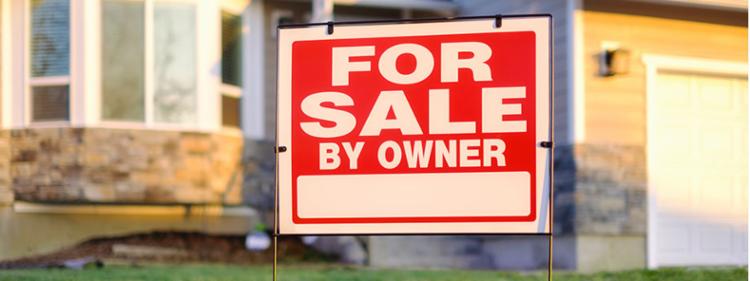8 Tips When Purchasing a Home For Sale By Owner

So, you want to buy a house, and the seller doesn’t want to use a real estate agent. Why? Who knows. It could be to save money on agent fees, but, this is what they call a good ol’ fashioned “For Sale By Owner” situation. An FSBO, as the name states, is when a homeowner decides to list and sell their home agent-free.
The process of buying an FSBO home can be challenging and present a number of hazardous situations. But, in the end, if done safely and with proper guidance, it can be very rewarding. Just make sure you're covered with an affordable home insurance policy.
Here are some tips that we recommend you wade through before diving in. We just want you to be safe and appropriately prepared. We’re sweet like that.
Tip #1: Understand the Sacrifice
Just because a seller doesn’t want to work with a pro, doesn’t mean you can’t. Realtors are filled with heaps of helpful tidbits, so it’s a pretty smooth move to enlist one. You just have to figure out how to pay their worth-every-penny fees.
If you choose to follow suit and skip an agent’s services, you’ll be missing out on all their real-estatey superpowers, like market analysis, price negotiation, inspection services and more. One of the most important things is navigating through stacks on stacks on stacks of boring paperwork to make sure your best interests are covered.
Now that that’s been said, let’s get you rollin’.
Tip #2: Seek PRE-Approval
Before you buy 8 cans of mayonnaise beige for a mudroom makeover, you need to get pre-approved for a mortgage. That’s right, time to dig up pay stubs, tax returns, lotto income filings and hand it over to a mortgage lender.
They’ll sift through it all and let you know if, and for how much, you’ve been approved. Though tedious, the pre-approval process sets your price range, shows the seller you’re ready for business and can be a pretty powerful negotiating tool.
“If there are other bidders on the property, the one who doesn’t have a pre-approval letter is odd man out,” Robert Irwin says. “The one with the strongest pre-approval letter, all else being equal, often gets the house.”
Tip #3: Stay Focused
When touring a home, it’s common practice to scoff at poor design choices and sneer at bad shower tile; that’s totally your right. However, without a realtor, the owner will most likely be showing you the property in person, and those scoffs and sneers are best left bottled up — at least until you get to the car.
But don’t let your fear of offending the owner stop you from doing your job. Open every door, turn on (and off) every light, inspect closets, mechanical thingies and leave no ductwork unchecked. This is a big purchase, and flying through the process in the name of decorum can lead to some messy circumstances.
Tip #4: Get A C.L.U.E.
Honesty is always the best policy, but a shady seller could be trying to unload their money pit. That’s why it’s important to get yourself a Comprehensive Loss Underwriting Exchange, or CLUE, report. Whoo-hoo, another acronym!
A CLUE report will show if any insurance claims have been filed within the last five years so you know if there has been any major damage or disgusting mishaps. If a claim pops up, it’s not game over, just ask to see all documentation relating to the claim and repairs to make sure everything was resolved.
CLUE reports cost around $20 and require the owner’s permission. If they refuse, RUN. Chances are they’re hiding something.
Tip #5: Make ’Em An Offer
By this step, you’ve looked and liked the house, you’re pre-approved and studied the CLUE report front to back, but before you submit the offer, you might want to go through this quick step-by-step process.
- Buy a manila folder.
- Fill it with market comps of similar homes.
- Comb through them all.
- Look at the seller’s asking price.
- Weigh it against the comps in your folder.
- Make an offer.
- Await their reply or potential counteroffer.
- Decide to either accept, counter back or leave the battlefield.
If you want to skip steps 1-5, you could you could just pay for a professional to appraise it. Sure, it may cost you $300-$500, but it will give you a rock-solid idea of the home’s worth as well as a mic-dropping argument to pair with your offer.
Tip #6: Look Under the Rug
Like Nana always says, “Offer accepted. Let’s get that home inspected.” Seriously, she says that so much.The whole home inspection thing can be a little bit boring and a lotta bit weird. I mean, you follow around some stranger who prods, opens and searches every square foot of your potential new home.
Despite your personal discomfort, it’s important to pay attention to make sure they didn’t hide any red flags. Once the inspection report is finalized, review it with both the inspector and the homeowner and use it as justification for any necessary repairs, upgrades or even changes to your initial purchase offer.
Tip #7: Lawyer Up
This is a huge purchase — no duh — and it’s best to do it with competent legal help … despite the “simplification” of modern real estate contracts.
According to Statistic Brain, insufficient knowledge of the paperwork is the hardest part of an FSBO transaction, making a legal expert a necessity.
Just like license plates, each state has different standards, and while most don’t require a lawyer, it’s definitely a justified expense to make sure every T and I is crossed and dotted.
They can also do a title search to make sure there are no liens against it, and you can feel confident in your brand-new, super-clean title.
Tip #8: Earnest Goes to Third-Party Camp
To wrap this puppy up, you’ll likely be required to pay some earnest money that secures your deal. This requires a third party. NOTE: We recommend against putting all your money in one of those old-timey burlap money sacks with a dollar sign on it. Too obvious.
Also “never allow the seller to hold your earnest money deposit, but instead ask that it be deposited into an escrow account. The ideal time to open one is with the deposit of your earnest money,” advises Shannon O’Brien of RealEstate
Real estate deals go sideways all the time, and using an escrow account ensures your money is safe in the unfortunate, and uncool, event that something does go wrong.
Time to Turn the Key
That’s it. You’re all set to buy your first/next FSBO home with confidence and peace of mindedness. I’ll leave you with one final piece of advice that always echoes in the back of my mind during big life decisions: You gotta do your homework.
It’s something my father-in-law says often (with a robust Minnesotan accent) that always rings true. So, Google it. YouTube it. Ask a friend. Ask a stranger. Ask a strange friend. Just make sure you're covered with an affordable home insurance policy.
